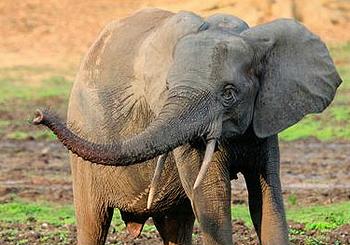
WASHINGTON, DC, April 26, 2013 (ENS) – Conservation groups have been forced to evacuate their staff members from the Central African Republic, where large numbers of elephants are being poached amidst a chaotic struggle for leadership of the country.
The World Wildlife Fund has confirmed that forest elephants are being poached near the Dzanga-Sangha protected areas, a World Heritage Site situated in the north-western Congo Basin, where Cameroon, Central African Republic and Congo meet.

The unstable security situation is keeping park staff from searching the dense forest for elephant carcasses, but elephant meat is reportedly being sold in local markets and nearby villages.
Due to the violence and chaos in the area, the exact number of elephants slaughtered is not known, but initial reports indicate it may be extensive, WWF said Thursday.
The global conservation group WWF and the New York-based Wildlife Conservation Society have evacuated their personnel to safety. Both groups have worked to conserve the animals and their habitat in the Central African Republic for many years.
WWF Director General Jim Leape said, “The elephant poaching crisis, driven by insatiable ivory demand, is so severe that no area is safe, not even the World Heritage Site Dzanga-Sangha where both WWF and WCS have now worked for the conservation of elephants for decades.”
“Heroic rangers are standing firm in the face of immense danger, but they alone cannot safeguard the special species and places the world treasures,” Leape said.
Situated in the north-western Congo Basin, where Cameroon, Central African Republic and Congo meet, the Dzanga-Sangha protected areas are three contiguous national parks totalling around 750,000 hectares. Sangha is inhabited by populations of forest elephants, critically endangered western lowland gorilla, endangered chimpanzees and many other endangered animal species.
Both organizations are calling on the Central African Republic and its neighbors to immediately increase security in the region to protect the area’s people and elephants.

Up to 30,000 elephants are killed in Africa each year for their ivory tusks, which are in great demand in Asia.
Governments are holding an extraordinary meeting next week to discuss ways to stop the poaching.
“When meeting next week, Central African governments must urgently join forces against this criminal activity that is also threatening the stability and economic development of their countries,” Leape said. “I encourage them in the strongest terms to take a stand against wildlife crime and together declare that poaching and illicit trafficking will not be tolerated.”
Wildlife Conservation Society President and CEO Cristian Samper said, “Together, WCS and WWF are calling on the Central African Republic government to immediately increase security in the region to protect these elephants from poachers and is asking other regional governments to provide assistance to stop the killing. Our staffs have been forced to evacuate in the chaos.”
“I recently visited Central African Republic and saw first-hand that without a full-time conservation presence in the region, these elephants are in jeopardy from poachers. WCS and our partners will continue to work tirelessly to protect elephants across their range,” said Samper.
WWF has worked in Dzanga-Sangha for 30 years and supports protected area management, gorilla research, law enforcement and tourism development.
WCS has been in the area for than 20 years, in charge of monitoring and research of the elephants of Dzanga Bai, a forest clearing containing a mineral-rich watering hole.
In addition, WCS works immediately across the border in the Republic of Congo to protect the same population of elephants there where the government is working to ensure their additional security on that side of the border.

Despite an appearance of stability over the past 10 years when General François Bozizé was in power, his rule was marked by corruption, underdevelopment and authoritarianism. An alliance of armed opposition factions known as the Séléka Coalition rebelled, waging the Central African Republic Bush War and the 2012–2013 Central African Republic conflict. They overthrew Bozizé on March 24, 2013.
The rebel leader Michel Djotodia proclaimed himself president. Nicolas Tiangaye remained as the prime minister as he was recently appointed and was allowed by the Séléka rebels to retain his post.
But leaders of the six-nation Economic Community of Central African States refused to recognize Djotodia as president, proposing instead the formation of an transitional council and the holding of new elections. Djotodia signed a decree on April 6 for the formation of a council that would act as a transitional parliament. The 97-member council is tasked with electing a president to serve prior to elections in 18 months.
On April 19, an extraordinary summit of heads of state and government of Central Africa agreed to recognize the transitional council and send a total of 2,000 soldiers to the Central Africa Multinational Force to support the efforts of the transition government.
Meanwhile, the United Nations has appointed Mary Robinson, former Irish President and former UN High Commissioner for Human Rights, as Special Envoy of the Secretary-General for the Great Lakes region of Africa.
Robinson will visit the Central African Republic, one of 11 signatories to the UN-brokered Peace, Security and Cooperation Framework for the Democratic Republic of the Congo and the Region, adopted in February.
“This agreement represents an avenue of hope for the people of the region to build stability by addressing the root causes of the conflict and fostering trust between neighbors,” according to Framework of Hope, a paper summarizing the accord and the Special Envoy’s mandate issued by Robinson’s office.
Copyright Environment News Service (ENS) 2013. All rights reserved.
© 2013, Environment News Service. All rights reserved. Content may be quoted only with proper attribution and a direct link to the original article. Full reproduction is prohibited.
